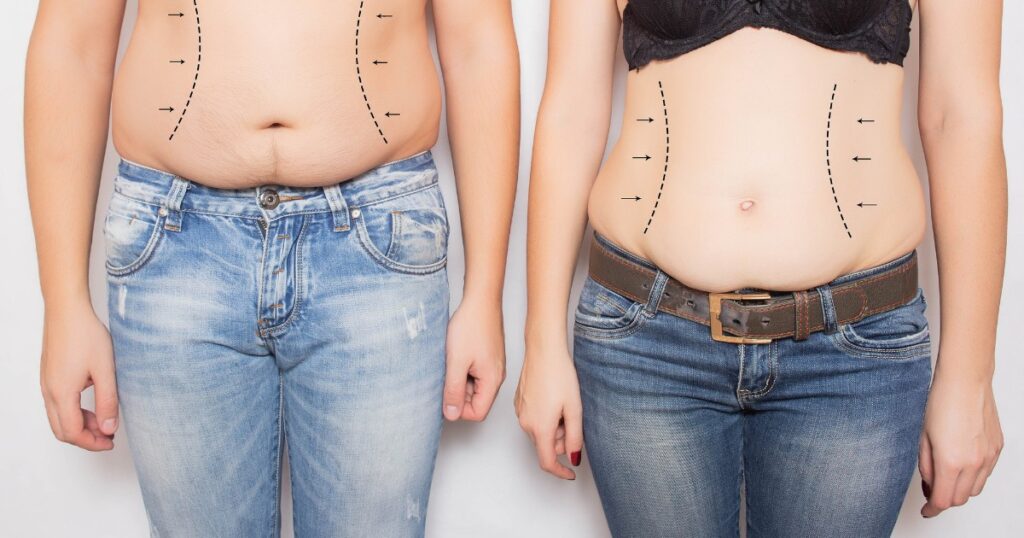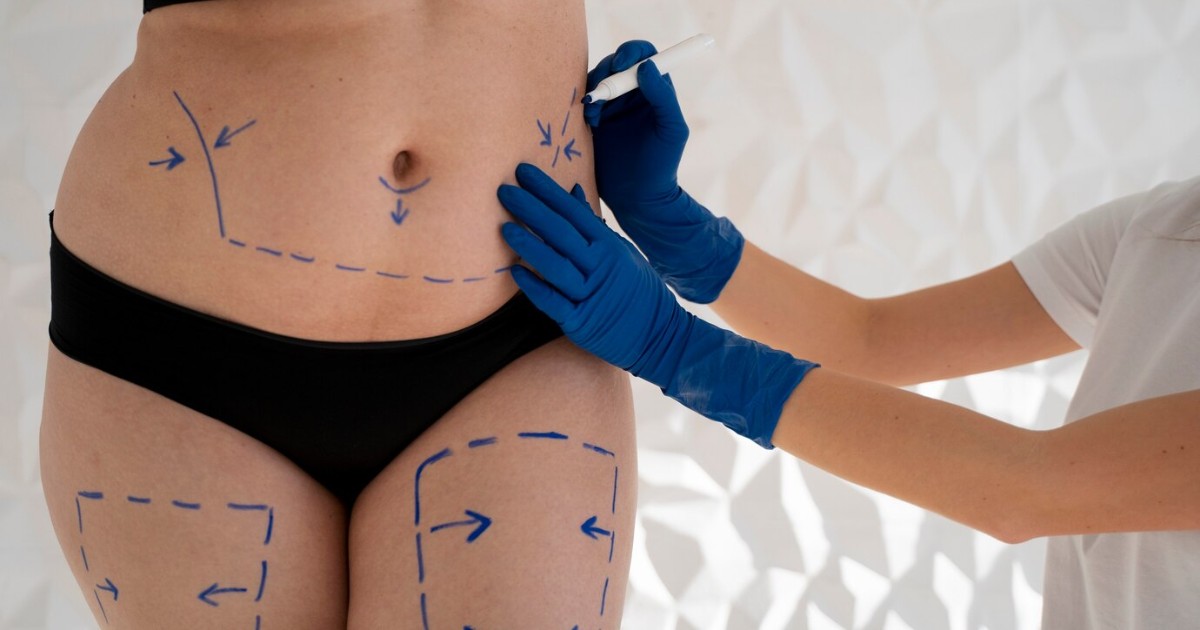Excess body fat is removed in liposuction, resulting in a refined and sculpted body contour. The increasing use of Liposuction for obesity treatment indicates its efficacy in managing the disease. Obesity, a condition characterised by excessive fat accumulation, is commonly treated with the technique. Decisions on obesity treatment should be rooted in understanding liposuction’s principles, procedures, and benefits.
Utilising Liposuction For Obesity Treatment
Liposuction is a cosmetic procedure often considered for the reduction of localised fat deposits, yet its effectiveness as a treatment for obesity is subject to debate. While not a substitute for lifestyle changes, it may play a role in jumpstarting weight loss efforts for some individuals.
- Targeted Fat Reduction: Liposuction is designed to remove stubborn fat from specific areas and is not a comprehensive obesity treatment.
- Limited Impact : It does not significantly affect body weight, obesity-related health issues, or prevent the visceral fat associated with chronic conditions.
- Supplementary Strategy : This may be used as part of a broader weight management plan, including diet and exercise, particularly for those who are not morbidly obese but struggle with specific fat-prone areas.
The Liposuction Procedure: An Overview
In liposuction, excess fat is removed surgically from areas resistant to diet and exercise. The process involves using a minor, thin tube called a cannula inserted into the body to suction out fat cells. It is usually performed under general anaesthesia, and recovery times can vary depending on the extent of the surgery.
- Invasive Nature : Liposuction is an invasive surgical procedure requiring anaesthesia and recovery time.
- Targeted Fat Reduction : The procedure specifically targets localised fat deposits, offering body contouring benefits.
- Duration: A liposuction procedure typically lasts one to several hours, depending on the extent.
- Outpatient Procedure : Most liposuction surgeries are outpatient, allowing patients to return home the same day.
- Recovery Time: Liposuction recovery may span from a few days to several weeks, depending on the surgery scale and the patient’s healing ability.
- Variability: Multiple liposuction techniques exist, including tumescent , ultrasound-assisted, and laser-assisted liposuction, each with unique pros and cons .
- Postoperative Care : Strict postoperative care, including compression garments and limited physical activity, is crucial for optimal results.
Liposuction and Fat Reduction: How Does it Work?
“Liposuction effectively removes subcutaneous fat – the fat layer beneath the skin – from targeted body areas. However, it does not eliminate visceral fat surrounding internal organs, which can only be reduced through a consistent regimen of diet and exercise. Post-liposuction, the role of diet and exercise becomes crucial in maintaining results and overall health. The amount of fat safely extracted in a single session is limited, typically at least five litres.”
| Parameter | Description | Details |
| Targeted Fat | Subcutaneous | Liposuction targets the layer of fat just beneath the skin but doesn’t affect visceral fat around internal organs. |
| Amount of Fat Removal | Limited | Typically, no more than about five litres of fat can be safely removed in a single session. |
| Impact on Health | Minimal | The procedure does not mitigate obesity-related conditions like diabetes or heart disease. |
| Primary Goal | Body Contouring | The procedure is intended mainly for aesthetic improvements, not significant weight loss. |
| Results Duration | Permanent (with lifestyle maintenance) | Removed fat cells do not regenerate, but the remaining cells can expand with weight gain. |
| Ideal Candidates | Individuals with localised fat deposits and relatively average body weight | Those seeking treatment for obesity or substantial weight loss may need to consider alternatives. |
Assessing Liposuction For Obesity Treatment Option
Liposuction is primarily a cosmetic procedure designed to sculpt and contour the body rather than a weight-loss solution. It doesn’t address the metabolic and lifestyle factors associated with obesity. Medical experts often recommend lifestyle modifications and medical interventions as primary treatments for obesity.
Book A Consultation With Dr Tarek Bayazid
Top-rated Plastic Surgeon For Liposuction in Dubai
Installment Plan Available
| Parameter | Description | Details |
| Weight Loss Solution | Not Primary | Liposuction is mainly for body contouring and does not significantly reduce overall body weight. |
| Impact on Obesity | Minimal | It doesn’t address the metabolic and lifestyle factors associated with obesity. |
| Alternatives | Lifestyle modifications, Bariatric Surgery, Medical Interventions | These are recommended as primary treatments for obesity, especially in severe cases. |
| Long-term Effectiveness | Questionable | Without lifestyle changes, the effectiveness of liposuction in managing obesity is limited. |
| Ideal Candidates | Individuals with Normal Body Weight | Those with localised fat deposits, not seeking substantial weight loss, are ideal candidates. |
| Impact on Overall Health | Limited | The procedure’s impact on overall health and obesity-related conditions is minimal. |
Potential Risks and Complications of Liposuction

Like all surgeries, liposuction poses several risk factors and potential complications, including infection, bleeding, and adverse reactions to anaesthesia. When considering Liposuction for obesity treatment, it’s essential to be aware of these risks.
Postoperative complications may include contour irregularities, numbness, and prolonged swelling. Proper postoperative care and choosing an experienced surgeon are crucial in minimising these risks.
| Parameter | Description | Details |
| Infection | Standard surgical risk | Proper postoperative care can help prevent infections. |
| Bleeding | Standard surgical risk | Occurs infrequently and can be managed with prompt medical attention. |
| Contour Irregularities | Common postoperative complication | It can result from poor healing and may require additional procedures for correction. |
| Numbness | Potential postoperative complication | Usually temporary but can be permanent in some cases. |
| Swelling and Bruising | Common postoperative symptoms | Typically, it resolves over time with proper care. |
| Surgeon Selection | Crucial for minimising risks | Choosing an experienced, board-certified surgeon is essential. |
The Long-Term Efficacy of Liposuction
While liposuction permanently removes fat cells from targeted areas, it doesn’t prevent weight gain in other body areas. Patients must maintain a healthy lifestyle, including regular exercise and a balanced diet, to preserve the results. Failure to do so may lead to disproportionate fat accumulation in untreated areas.
- Permanent but Limited: Removed fat cells won’t regenerate, but new weight gain can occur in other areas.
- Healthy Lifestyle Maintenance: Regular exercise and balanced nutrition are crucial for sustaining results.
- Disproportionate Fat Accumulation: Weight gain post-procedure may appear uneven due to the permanent removal of fat cells in specific areas.
- No Impact on Metabolism: Liposuction does not affect the body’s metabolic rate or its ability to store fat.
- Body Mass Index (BMI): Individuals with a BMI within the normal range are likely to experience more sustainable results.
- : Long-term satisfaction requires understanding the limits of the procedure and maintaining realistic expectations.
Alternatives to Liposuction for Weight Loss

There are multiple alternatives to liposuction for weight loss, including dietary modifications, increased physical activity, and behavioural changes. Bariatric surgery is also a viable option for those with severe obesity. Non-surgical interventions like cool sculpting and injectable treatments are gaining popularity for fat reduction.
| Parameter | Description | Details |
| Dietary Modifications | Fundamental for weight loss | Adopting healthy eating habits is crucial for weight loss and management. |
| Physical Activity | Essential for calorie burn and overall health | Regular exercise is foundational for maintaining a healthy weight and improving overall health. |
| Bariatric Surgery | Option for severe obesity | It may be recommended for individuals who have yet to succeed with other methods. |
| Non-Surgical Methods | Cool sculpting, injectable treatments | These offer non-invasive fat reduction options with minimal downtime. |
| Behavioural Changes | Necessary for sustainable weight loss | Modifications in lifestyle and behaviour are integral components of effective weight management. |
| Financial Consideration | Alternatives may be more cost-effective and covered by insurance in some cases | Considering financial implications is important when choosing a weight loss method. |
Psychological Implications of Liposuction
Undergoing liposuction can have a significant impact on an individual’s psychological well-being. While the procedure, often explored as Liposuction for obesity treatment, may enhance body image and self-esteem, it can also lead to unrealistic expectations and dissatisfaction if the results are unexpected. A comprehensive psychological assessment and realistic expectation setting are critical before the procedure.
| Parameter | Description | Details |
| Self-Esteem Enhancement | Possible positive outcome | Improved body contouring can lead to increased confidence and body satisfaction. |
| Unrealistic Expectations | Common psychological concern | Managing expectations is crucial to avoid disappointment with the results. |
| Impact on Body Image | Potential for both positive and negative effects | Postoperative satisfaction greatly depends on preoperative expectations and psychological resilience. |
| Psychological Assessment | Necessary preoperative step | Evaluating the psychological state before the procedure is crucial to ensure the patient can cope with the results. |
| Emotional Recovery | An integral part of postoperative care | Providing emotional support post-surgery is important for overall well-being and recovery. |
| The risk of Body Dysmorphia | is Elevated in individuals with pre-existing conditions | Individuals with body image disorders may experience increased risk and should be assessed thoroughly before the procedure. |
Cost and Accessibility of Liposuction
Liposuction is costly, and its accessibility can be limited based on geographic location and socioeconomic status. The price of liposuction in Dubai can vary widely, depending on the extent of the procedure and the area of the body being treated. Most insurance plans do not cover liposuction since it is primarily considered a cosmetic procedure. Liposuction Fat Dissipation is a process where doctors use special tools to remove extra fat from your body. It’s like vacuuming out the unwanted fat to make you healthier and slimmer.
| Parameter | Description | Details |
| Average Cost | AED 10,000 to AED 30,000 per area treated | Prices vary widely based on the surgeon’s experience, clinic location, and the number of areas being treated. |
| High-End Clinics | AED 20,000 to AED 50,000 per area treated | Prestigious clinics often charge more due to the reputation and experience of the surgeons and the quality of postoperative care provided. |
| Geographic Accessibility | Highly accessible | Dubai, a medical tourism hub, offers numerous reputable liposuction clinics. |
| Insurance Coverage | Rarely covered | Liposuction is typically considered a cosmetic procedure and is not covered by most insurance plans. |
| Financial Planning | Necessary | Considering the high costs involved, proper financial planning and budgeting are crucial. |
| Medical Loan Options | Available | Several clinics offer financing options or have tie-ups with financial institutions to provide medical loans. |
| Cost Variability | Substantial | Obtaining multiple quotes and evaluating the included services and surgeon’s experience is essential to make an informed decision. |
The Ethical Debate Surrounding Liposuction for Obesity
Promoting liposuction as a solution to obesity raises several ethical questions, including concerns about exploiting vulnerable individuals and perpetuating unrealistic beauty standards. The procedure’s cosmetic nature and its lack of impact on overall health and lifestyle make it a controversial option for obesity treatment. The ethical considerations necessitate thorough informed consent and patient education about the procedure’s limitations.
- Exploitation Concerns: Vulnerable individuals seeking quick solutions may be exploited, raising ethical red flags.
- Unrealistic Beauty Standards : Promoting liposuction can perpetuate harmful societal beauty norms and body image pressures.
- Lack of Health Impact: Given its minimal impact on overall health, the ethicality of promoting liposuction for obesity is questioned.
- Informed Consent : Comprehensive patient education and understanding of the procedure’s limitations are crucial to ethical practice.
- Vulnerable Populations : Individuals with severe body image issues or unrealistic expectations are particularly susceptible to exploitation.
- Role of Medical Community : The medical community’s responsibility is to promote health and well-being over aesthetic ideals, reinforcing the importance of ethical considerations in offering liposuction for obesity.
Liposuction effectively removes localised fat but isn’t a complete solution for obesity. It doesn’t address the root causes of obesity or ensure long-term weight loss and metabolic health. Though Liposuction for obesity treatment offers certain benefits, a holistic approach, including lifestyle and dietary changes, is essential for effective obesity management.
Make your aesthetic journey a success with Dr Tarek Bayazid , Dubai’s esteemed plastic surgeon renowned for delivering natural results in body contouring and facial rejuvenation. Dr Tarek is someone who combines art and surgical precision while ensuring patient safety and satisfaction. With an advanced approach and dedication to excellence, he tailors recovery to individual needs.
Are you ready to transform your vision into reality? Book a consultation with Dr. Tarek today to experience true beauty and health.











Related Posts